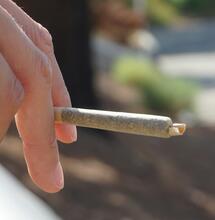Cannabis Research Gone Viral

It's uncommon for a science paper to go viral, but when the two focal points of the research presented in the paper are Cannabis + Covid-19, things apparently can end up somewhat misinterpreted. At least that's what seems to have happened to the research presented earlier this week by a team of researchers at the University of Oregon.
With booming legalization everywhere, cannabis undoubtedly is a hot topic. As legislators debate in senates and parliaments around the world whether the plant and its derivatives should be made legal, how products should be regulated, or how much tax should be charged for legally sold cannabis goods, more and more people are getting acquainted with the medical and recreational benefits of weed.
When it comes to health, we are all a little bit more sensitive these days. There's a swirling pandemic that has changed the fiber of our everyday life. Covid-19 has undoubtedly sent scientists in a sleepless quest to find out as much as possible how to tackle the virus as well as to search for more effective drugs and treatment methods that will help put an end to the pandemic madness.
On January 10, a team of researchers from Oregon State University issued a paper in the Journal of Natural Products, presenting their findings that cannabinoid acids such as CBGA and CBDA have the capacity to neutralize the coronavirus. The study received gargantuan media coverage. By Wednesday morning (Jan 12), it was going viral all over the internet.
"All this time we've been listening to the C.D.C., we should have been eating CBD," Jimmy Kimmel made audiences burst into a laugh at his show. While that weights more on the humor side, a lot of people took it seriously that smoking weed stops Covid-19. How the public liked to perceive the study results and what exactly the researchers aimed to communicate with rolling out the brief on the lab tests are two different dimensions, however.
For example, one user on Twitter wrote the following status: "I don't know which strain is supposed to help stop COVID, so I'm just smoking as much weed as possible." This tweet comes as a response to another tweet: "I still haven't got covid and I am 100% crediting my abundant consumption of cannabis."
Fortunately, not everyone jumped on the same bandwagon. Another user writes: "In case you shared that "cannabis can help fight COVID-19" story yesterday, know that the research there had to do with a cannabinoid that was not THC. Thus, you would not get "high" from any treatment derived from that compound." And that much is true.

As earlier explained, cannabinoid acids like CBGA and CBDA are derived from fresh hemp, and these are precursors of CBG and CBD. CBG is a minor cannabinoid, which is still examined for its array of medical potentials. CBD is more established and already has numerous applications in medicine, being used to treat various ailments.
While all cannabinoids have their precursors in the form of cannabinoid acid, including the psychedelic THC which pre-exists as THCA, they convert with exposure to heat, a process very well known as decarboxylation. In the recent study conducted by the Oregon university researchers, decarbed weed was not even mentioned.
So, what does the study say?
Richard van Breemen from Oregon State's Global Hemp Innovation Center, who led the study, discussed that the cannabinoid acids tested in lab were able to counteract key protein structures of the virus that the virus uses to inflict damage on healthy cells. To give the full name of these acids, cannabigerolic acid (CBGA) and cannabidiolic acid (CBDA), both may be used to target the same protein structures of the virus that vaccines and other antiviral drugs target when administered in the body. CBGA and CBDA were also found to be equally effective against two different variants of the virus, the alpha and the beta variant.
The study conducted by van Breemen along with other collaborators at the Oregon Health and Science University is exciting, to say the least, as it opens new avenues of research. Van Breemen suggests, "the combination of vaccination and CBDA/CBGA treatment should make for a much more challenging environment for SARS-CoV-2."
The researcher further hints that the cannabinoids would have their best effect in their isolated form or in the form of hemp extract, if medicine seeks their potential in preventing as well as treating a Covid-19 infection. Or in other words, the cannabis compounds examined in the study are not those that most pot users are after when they visit the dispensary or dial their dealer.
One final thought? You can always use weed to improve your mood, health, and well-being but don't bet your chances if you catch Covid-19, and especially not if you develop a serious form of the disease. In fact, for any health condition that might be giving you the concern, direct to a physician. Even if weed is the answer, better be safe than sorry.



